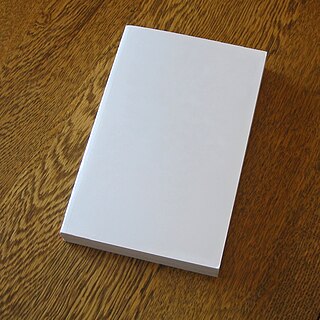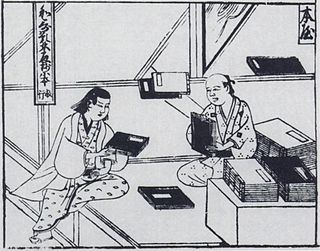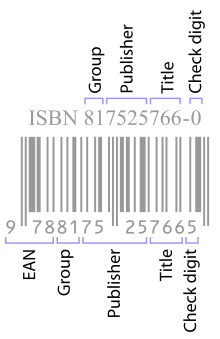
The International Standard Book Number (ISBN) is a numeric commercial book identifier that is intended to be unique. Publishers purchase ISBNs from an affiliate of the International ISBN Agency.
An international standard is a technical standard developed by one or more international standards organizations. International standards are available for consideration and use worldwide. The most prominent such organization is the International Organization for Standardization (ISO). Other prominent international standards organizations include the International Telecommunication Union (ITU) and the International Electrotechnical Commission (IEC). Together, these three organizations have formed the World Standards Cooperation alliance.

A paperback, also known as a softcover or softback, is a type of book characterized by a thick paper or paperboard cover, and often held together with glue rather than stitches or staples. In contrast, hardcover or hardback books are bound with cardboard covered with cloth, plastic, or leather. The pages on the inside of a paperback are made of paper.

Joseph Whitaker was a publisher who founded Whitaker's Almanack.
The Hon. David John Smith was the third son of Frederick Smith, 2nd Viscount Hambleden, and Lady Esther Gore. He was educated at Eton College and University of Oxford and served in the Second World War, gaining the rank of Major in the service of the Royal Artillery.
George Bell & Sons was a book publishing house located in London, United Kingdom, from 1839 to 1986.
A & C Black is a British book publishing company, owned since 2002 by Bloomsbury Publishing. The company is noted for publishing Who's Who since 1849. It also published popular travel guides and novels.
R. R. Bowker LLC is an American limited liability company domiciled under Delaware Limited Liability Company Law and based in New Providence, New Jersey. Among other things, Bowker provides bibliographic information on published works to the book trade, including publishers, booksellers, libraries, and individuals; its roots in the industry trace back to 1868. Bowker is the exclusive U.S. agent for issuing International Standard Book Numbers (ISBNs), a universal method of identifying books in print. Bowker is the publisher of Books in Print and other compilations of information about books and periodical titles. It provides supply chain services and analytical tools to the book publishing industry. Bowker is headquartered in New Providence, New Jersey, with additional operational offices in England and Australia. It is now owned by Cambridge Information Group.

Edward Elgar Publishing is a global publisher of academic books, journals and online resources in the social sciences and law. The company also publishes a social science and law blog with regular contributions from leading scholars.

Sampson Low was a bookseller and publisher in London in the 19th century.
BookScan is a data provider for the book publishing industry that compiles point of sale data for book sales, owned by The NPD Group in the United States and the Nielsen Company in the United Kingdom, Ireland, Australia, New Zealand, India, South Africa, Italy, Spain, Brazil, Mexico, and Poland.
The Bookseller is a British magazine reporting news on the publishing industry. Philip Jones is editor-in-chief of the weekly print edition of the magazine and the website. The magazine is home to the Bookseller/Diagram Prize for Oddest Title of the Year, a humorous award given annually to the book with the oddest title. The award is organised by The Bookseller's diarist, Horace Bent, and had been administered in recent years by the former deputy editor, Joel Rickett, and former charts editor, Philip Stone. We Love This Book is its quarterly sister consumer website and email newsletter.
Frederic Gordon Foster was an Irish computational engineer, statistician, professor, and college dean who is widely known for devising, in 1965, a nine-digit code upon which the International Standard Book Number (ISBN) is based.

David Nutt was a British book publisher and bookseller.
William Collins, Sons was a Scottish printing and publishing company founded by a Presbyterian schoolmaster, William Collins, in Glasgow in 1819, in partnership with Charles Chalmers, the younger brother of Thomas Chalmers, minister of Tron Church, Glasgow.
Mitchell Beazley Publishers Limited is a British book publisher which is particularly specialised in atlases, reference books, natural history books, cook books, garden books and wine books.

Book trade in the United Kingdom has its roots as far back as the 14th century, however the emergence of internet booksellers such as Amazon partnered with the introduction of the e-Book has drastically altered the scope of the industry. Book retailers such as the Borders Group have failed to adjust to these changes, thus there has been a steep decline in the number of operating traditional and independent bookshops. However, still heavily influential on the trade globally, British publishers such as Penguin Books and Pearson remain dominant players within the industry and continue to publish titles globally.
Oak Knoll is a bookseller and publisher based in New Castle, Delaware, United States. Oak Knoll includes Oak Knoll Books which specializes in the sale of rare and antiquarian books and Oak Knoll Press which is a publisher and distributor of in-print titles. Both divisions specialize in "books about books" on topics such as printing history, bibliography, and book arts. Oak Knoll has also been the sponsor of the book arts festival Oak Knoll Fest.
BookNet Canada (BNC) is an industry-led, non-profit organization that develops technology, standards, and education to serve the Canadian book industry. It is partially funded by the Department of Canadian Heritage and is accountable to the Government of Canada for servicing and reporting on the Canadian book industry.

The selling of books dates back to ancient times. The founding of libraries in c.300 BC stimulated the energies of the Athenian booksellers. In Rome, toward the end of the republic, it became the fashion to have a library, and Roman booksellers carried on a flourishing trade.








